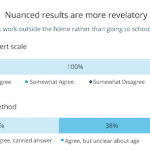Big Data and AI in Africa: Why the Future of the Continent Is Artificially Intelligent and Digitally Enabled
Have you ever been stuck in a congested African city (read Lagos or Nairobi) and wondered how much easier commuting would be if things were a little more automated? Efficient sensors and traffic lights could easily collect data on traffic conditions, predicting or preventing congestion. That’s just one example of how much easier life would be for the average African if technology were utilized to its fullest potential.
This potential can be seen particularly clearly at the intersection of two emerging technology sectors, big data and artificial intelligence (AI). Data is fast becoming the leading global commodity. Kai- Fu Lee, author of “AI Superpowers,” has dubbed it the “new oil.” But unlike oil, data is not a finite good: It will always exist, and if properly harnessed, it can cause a “data boom,” presenting many opportunities for economic development. Meanwhile, according to PwC, AI has the potential to add over $15 trillion to the global economy in 2030. Western countries have used AI to impact education, human capital, healthcare and finance – all catalysts for economic growth. AI can also play a key role in processing the massive, growing – and often unstructured – amounts of data the world is generating, to turn it into useful insights.
Africa may have arrived late to previous industrial revolutions, but with the emergence of AI and big data, the continent can be strategically positioned to play a part in the global digital revolution. Below, we’ll explore some of the ways African countries can leverage these technologies to support economic development – and some of the challenges they’re likely to encounter along the way.
A Tech-Fueled Path to Economic Development
A recent report by Google and the International Finance Corporation estimated that Africa’s digital economy has the potential to contribute $180 billion to the broader economy by 2025. Some of the leading players in the global tech sector are already positioning themselves to tap into that potential. For instance, in 2019 Google opened its first Africa-based artificial intelligence research center in Ghana – an auspicious move that will accelerate economic growth on the continent. Google is also working with a number of other African countries to develop AI talent. Meanwhile, other global tech giants – including IBM and Microsoft – have committed to developing Africa’s talent and contributing to its digital growth. These bold investments foretell Africa’s promising digital future.
In many ways, that future is already here, as traditional pathways to economic development have become increasingly an ancillary option. For instance, technology has begun to provide a viable alternative to dependency on natural resource extraction, which has actually decelerated economic growth in some African countries. In Congo, to take one example, the extraction of diamonds led to civil wars which in turn thwarted economic development. In contrast, tech-enabled innovation tends to have network effects, which can fast-track economic growth. Most users of technology-based innovations get added value, which they can pass on to other players in the economy. For instance, banks, businesses and consumers who utilize fintech solutions enjoy improved payment processes, which can save time and provide other benefits that reverberate throughout the network. The emergence of blockchain and cryptocurrency on the continent is a good example of these network effects – one of which is that it has given more Africans autonomy over wealth building.
Importantly, this economic growth isn’t limited to those who are already prospering: Thanks to the broad accessibility of technology, digital transformation can reduce the inequality gap and democratize opportunity, increasing prosperity and reducing poverty among traditionally excluded communities.
That accessibility is evident across multiple business sectors in Africa, where millions of people are using data-driven online services that range from fintech to e-commerce. Private citizens can start e-commerce businesses from the comfort of their homes, easily utilizing data-fueled social media tools to find customers. Farmers can use AI solutions through their mobile phones to identify crop damage and get market information and recommendations. Everyone from individuals to businesses can benefit from the multitude of platforms and services powered by AI and big data.
AI and Data for Education, Health Care and Finance
Though the economic impact of AI and data is broad, it can make a particular difference in some select areas. Take education, for instance: In a perfect world, Africa’s greatest economic asset would be its human capital – the continent has a young, vibrant population with limitless potential. All things being equal, this growing human capital should lead to increasing educational investment. Sadly, this is not the case for most African countries, where there is an immense demand for education, but the public delivery of it is undersupplied.
Artificial intelligence could remedy this market failure: For example, AI can provide targeted education by making learning outcomes more accessible and affordable for people who might not be able to attend a traditional learning facility. EdTech companies in Africa are utilizing AI to generate data on students’ needs and performance; in turn, these companies can deliver students skills-based education that equips them with the job skills they need to thrive during the digital revolution. AI can have a similar impact on gig economy jobs, which drive youth employment in a lot of African economies. An AI-first approach could boost the revenue of these independent workers by enabling them to utilize smart advertising to easily find the right clients, even if they lack a formal education.
AI and data can have a similar impact in the healthcare sector. In most African countries, there is a short supply of quality doctors and a large demand for adequate healthcare. AI could work in tandem with doctors to allow them to reach a wider range of people via telemedicine. For instance, virtual assistants and chatbots can utilize data analytics to consult with patients before they virtually see a doctor, leveraging AI to help decipher a patient’s symptoms and analyze his or her medical history. Additionally, AI has the capacity to train less-qualified medical professionals to help them make more informed medical decisions – a solution that can enable health clinic staff to treat a range of ailments without the involvement of a fully credentialed doctor. Low-feature mobile phones can also utilize AI to deliver healthcare advice via text messages, and AI can help enable the efficient sourcing of healthcare products in the supply chain. The COVID-19 pandemic has demonstrated how AI-backed telemedicine can make healthcare more accessible: To take just one example, practitioners are utilizing a coronavirus self-checker service to help patients self-assess their COVID-19 status and suggest a course of action.
There is already a proliferation of AI-backed fintech solutions in Africa, particularly focused on enabling systems to support payment transactions conducted via mobile phone. Both large and small businesses can use AI-powered fintech solutions to conduct seamless digital transactions, while tracking data on customer spending behavior that can help identify other sales opportunities. Banks can also use AI-based tools to recommend specialized savings plans to customers who might be struggling with money management. And if the right infrastructure is provided, AI could help build an efficient credit system in Africa by monitoring an applicant’s financial history and payment habits. This would provide private companies and banks with salient information to help make loan decisions.
The challenges facing AI and big data in Africa
Despite all their potential, AI and data-fueled technologies come with their own unique challenges. Like all machines, these technologies are the products of the people who design them. As a result, in Western countries, the use of AI has led to racial bias and unfair predictions; this bias has led to racial profiling and discrimination, among other issues. Due to Africa’s racial homogeneity, the hurdle of racial bias and discrimination might be easier to overcome – but it’s still something to closely monitor.
Other challenges involve the use and availability of data. Africa lacks quality data – that is, data that is refined and reliable. This lack of usable data can be detrimental to deploying accurate AI solutions. Additionally, there is a scarcity of AI talent in Africa. Some countries may not have the capacity to import AI talent, or to transfer AI knowledge to their own citizens, due to a lack of educational funding and infrastructure. That could mean this knowledge might only be acquired by a few privileged citizens, which would in turn worsen inequality. African countries can avoid these issues by directing sufficient capital, though foreign direct investment and public-private partnerships, to develop a sustainable AI environment and digital infrastructure, and to address the continent’s dearth of technological talent.
There is also the issue of “data colonialism” and the geopolitical confusion that comes with it. Where will Africa’s data be stored and how is it being used? The African Union can allay this concern by enforcing data localization. Furthermore, Africa cannot be excluded from the data privacy and security discussion. Foreign companies that want to invest in the continent’s digital revolution might try to cut corners by gathering data on African users without their consent, taking advantage of the poor governance and accountability that still plague many countries in the region. This can lead to corruption – as seen with the oil boom in Nigeria, where local communities were neglected and polluted by foreign petroleum companies working to extract and profit from their resources, while local governments stood by. There is no clear regulatory framework to govern the responsible use of AI, and there are not enough stringent laws and regulations to protect African citizens against this sort of outcome in the tech industry, leaving customers vulnerable to privacy breaches and data manipulation.
The role of African governance in optimizing the impact of AI and data
To head off these negative outcomes, the African Union should prioritize creating African data protection laws similar to the European Union’s General Data Protection Regulation. Of course, this is easier said than done – but it is feasible with good governance and effective policy making.
In addition to the aforementioned policy recommendation, African governments can:
- Invest in research and development for AI, data and other tech-focused initiatives.
- Provide grants and tax credits to companies that promote technological innovation.
- Make the internet more accessible and affordable for all citizens.
- Provide affordable options for citizens to acquire digital skills.
- Educate the general public about safe digital practices.
- Ensure that private companies are transparent about their data privacy policies.
If IBM’s Watson can beat humans in Jeopardy, Amazon’s Alexa can make playlists based on a person’s mood, and Apple’s Siri can predict the weather, then surely AI and big data can boost economic growth in Africa and significantly reduce poverty. Smart utilization of these technologies can provide solutions to some of the continent’s most difficult problems, from an under-skilled workforce and poor education, to ineffective healthcare systems and unsustainable finance. Data and AI will bring their share of problems to Africa, but the benefits that Africans will reap will far outweigh the costs. Whatever the coming years may bring, it’s clear that the future of Africa is artificially intelligent and digitally enabled.
Jasmine Nnenne Mbadugha is a dual degree candidate at the London School of Economics and Political Science, where she focuses on the growth of new technologies in emerging markets.
Photo courtesy of Angelo Moleele.
- Categories
- Education, Technology



